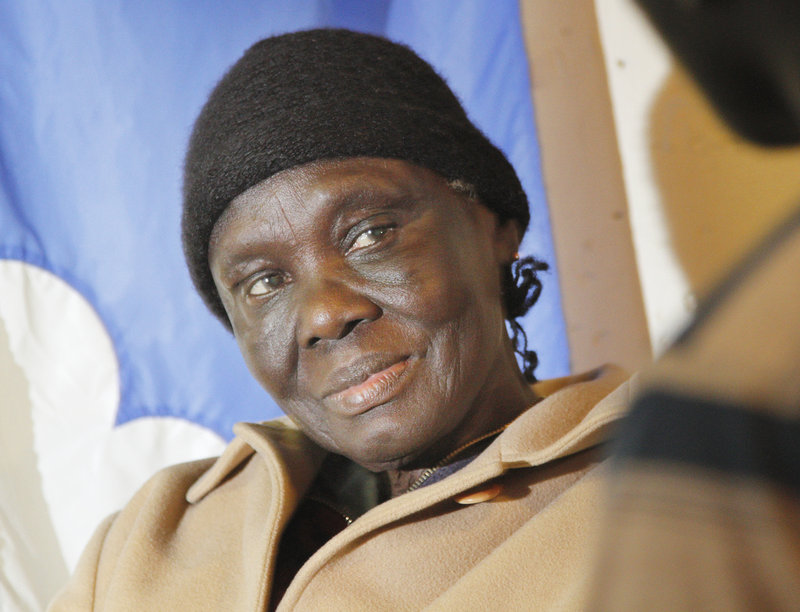PORTLAND – Escaping war and torture in southern Sudan and getting to the United States took its toll on 66-year-old Regina Dbek.
It’s one reason her health is too poor for her to work and support herself, she said. It’s also making it more difficult to overcome her latest challenge — to become a U.S. citizen.
“The reason she came here is because of war in her home; kids being tortured in her house,” said Alfred Jacob, who interpreted for Dbek last week as she spoke quietly in Acholi, her native language. “She lost her mother in the war. She was very lucky she escaped away. … She did not come here to collect government services.”
Dbek is one of several older refugees in her weekly citizenship class worried about state budget proposals to cut welfare benefits to some immigrants and refugees. In particular, they could be directly affected by a proposal to stop providing monthly cash benefits to elderly and disabled refugees who do not achieve citizenship before they exhaust their federal Supplemental Security Income benefits.
As many as 78 people statewide receive that benefit now at a cost of $368,000 a year, according to the state.
Dbek receives about $680 each month in federal SSI, which pays for her rent and her medicines, she said. Those benefits will expire in 2012, seven years after she resettled in the United States. And she worries that she may still not be a citizen and would have no way to pay her rent.
Can she work? “No job,” she said in Acholi, shaking her head. Family? “She has no one to support her,” Jacob said, translating.
Dbek is working to become a citizen, attending a weekly civics class taught by volunteers and studying English. Age and the trauma experienced as refugees make it harder for many older refugees to learn enough English and American history to pass the citizenship test, Jacob said.
In the class, volunteer instructor Judith Southworth holds up an image.
“Who is this person?” she asks.
Some of the students murmur the answer, “Christopher Columbus.”
“When do we celebrate Columbus Day?”
“October,” the class repeats, sounding less than certain.
Immigrants and refugees are required to be legal residents in the United States for five years before taking the citizenship test. In almost all cases, they must take it in English without a translator.
It is stressful even for young people, Jacob said. One woman he knows barely ate for three months before the test, he said.
It is hardest for older refugees, said Al-Fadel Arbab, a 26-year-old refugee from the Darfur region of Sudan who is now a citizen. And it will be much harder if they have to worry about paying rent and buying medicines, he said.
“If there is no assistance, they are not going to focus on ‘how do we study this.’ They will focus on ‘how do we eat,’” he said.
Kustansia Ounda, also a refugee from southern Sudan, said English is a hard language to learn. After two years of English classes twice a week, she can now carry on a basic conversation, though she feels more comfortable using a translator.
It also is difficult to remember American history, such as details about World War I and World War II and who was president when, she said.
“There are some she remembers and some that she can’t,” Jacob said, translating.
Ounda has had knee and back surgery and walks slowly, holding onto chairs or tables. She, too, receives about $680 a month in federal SSI and worries the assistance will run out.
She arrived nearly five years ago, so has two more years to become a citizen before the federal benefit expires.
Ounda still feels welcome here and said she hopes to take the test soon, but not because of welfare benefits.
“She wants to be a citizen in this place. She considers this her home,” Jacob said, translating.
Back in class, the students have gone over the names of the first 13 states.
Why did settlers come to the United States? Southworth asks.
“People came here to be f…” she writes on the board and pauses. “How do you spell ‘free’?”
Staff Writer John Richardson can be contacted at 791-6324 or at:
jrichardson@pressherald.com
Send questions/comments to the editors.



Success. Please wait for the page to reload. If the page does not reload within 5 seconds, please refresh the page.
Enter your email and password to access comments.
Hi, to comment on stories you must . This profile is in addition to your subscription and website login.
Already have a commenting profile? .
Invalid username/password.
Please check your email to confirm and complete your registration.
Only subscribers are eligible to post comments. Please subscribe or login first for digital access. Here’s why.
Use the form below to reset your password. When you've submitted your account email, we will send an email with a reset code.